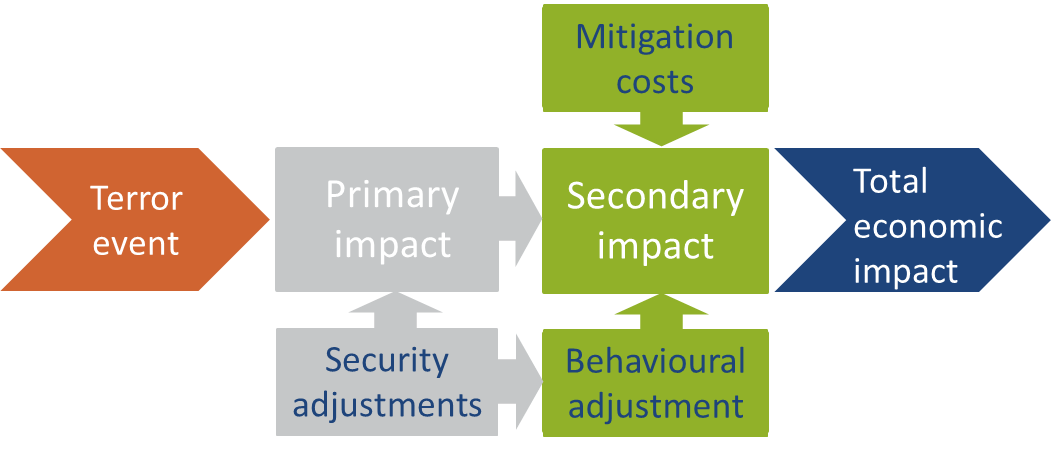Difference between revisions of "Economic effects of anti-terrorism security measures"
| Line 4: | Line 4: | ||
==Description== |
==Description== |
||
Estimation of the economic impact of counter-terrorism measures includes accounting for direct (primary) and indirect (secondary) effects, including both the costs and the benefits. Security measures, for example, make urban objects more resilient against terror attacks, but will also alter behaviour of economic agents (see the clickable map below). Moreover, security measure aiming to mitigate the indirect economic impact will |
Estimation of the economic impact of counter-terrorism measures includes accounting for direct (primary) and indirect (secondary) effects, including both the costs and the benefits. Security measures, for example, make urban objects more resilient against terror attacks, but will also alter behaviour of economic agents (see the clickable map below). Moreover, security measure aiming to mitigate the indirect economic impact will create positive spillover effects for the local economy, since the impact of an future terror event will be less unpredictable. Finally, also the actual impact on [[The economics of terrorist behaviour|terrorist behaviour]] should be taken into account in order to measure the effectiveness of the chosen security measures. |
||
<imagemap> |
<imagemap> |
||
Revision as of 10:20, 18 December 2012
Economic effects of anti-terrorism security measures
Security measures aiming to manage the risk of urban terrorism impose economic effects on society, the so-called economic effects of anti-terrorism measures. In essence, they can be classified as the costs of terrorism since they result from the actions of households, private agents and public agents in an attempt to prevent a terror event to occur, or at least to mitigate the effects of such an event.
Description
Estimation of the economic impact of counter-terrorism measures includes accounting for direct (primary) and indirect (secondary) effects, including both the costs and the benefits. Security measures, for example, make urban objects more resilient against terror attacks, but will also alter behaviour of economic agents (see the clickable map below). Moreover, security measure aiming to mitigate the indirect economic impact will create positive spillover effects for the local economy, since the impact of an future terror event will be less unpredictable. Finally, also the actual impact on terrorist behaviour should be taken into account in order to measure the effectiveness of the chosen security measures.
Costs of security
Direct (primary) costs of security
Indirect (secondary) costs of security
Benefits of security
Direct (primary) benefits of security
Indirect (secondary) benefits of security
Related subjects
- Economic main page
- belongs to::Economic impact
- Economic impact of urban planning
- Economic impact of security threats
- Economic impact of security measures
- Economic effects of anti-crime security measures
- Economic effects of anti-terrorism security measures
- Economics of criminal and terrorist behaviour
- Economic tools
- Economic output
Footnotes and references
MAP
<websiteFrame> website=http://securipedia.eu/cool/index.php?wiki=securipedia.eu&concept=Economic_effects_of_ant-terrorism_security_measures height=1023 width=100% border=0 scroll=auto align=middle </websiteFrame> <headertabs/>

